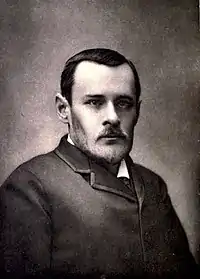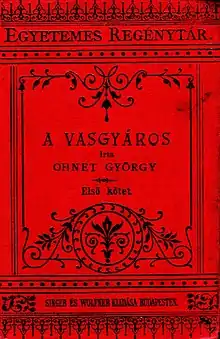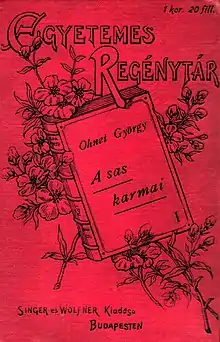Georges Ohnet
Georges Ohnet (3 April 1848, in Paris – 5 May 1918) was a French novelist and man of letters.

Life and career
Ohnet was educated at the Collège Sainte-Barbe and the Lycée Napoléon.[1] After the Franco-Prussian War he became editor of the Pays and the Constitutionnel in succession. In collaboration with the engineer and dramatist Louis Denayrouze (b. 1848) he produced the play Regina Sarpi, and in 1877 Marthe.
Ohnet was an admirer of Georges Sand and bitterly opposed to the realistic modern novel. He began a series of novels, Les Batailles de la vie, of a simple and idealistic character, which, although attacked by the critics as unreal and commonplace, were very popular. The series included Serge Panine (1881) which was crowned by the Academy; Le Maître de forges (1882), La Grande Marnière (1885), Volonté (1888), Dernier Amour (1891). Many of his novels have been dramatized with great success, Le Maître de forges, produced at the Gymnase in 1883, holding the stage for a whole year. His later publications include Le Crépuscule (1902), Le Marchand de Poison (1903), La Conquérante (1905), La dixième muse (1906). In 1902 he was elected president of the Société des Auteurs et Compositeurs Dramatiques.[1]
Style
Ohnet was a great reader of public taste. It was this astute understanding of his readership that helped him devise the passionate style he became famous for. He disdained the romantic melodrama motif, choosing instead to explore complex passion. His literary genius lays in being able to introduce originality into a genre so deeply archetypal as the romantic melodrama. It was this quality that made him one of the most widely read writers of his time.[2]
Works
Ohnet's magnum opus was the novel Le Maître de forges (The Owner of The Ironworks, 1882). The book became an instant hit, finding wide acceptance not only among French readers but also readers around Europe. Soon after its publication, it was translated into Spanish by the Filipino writer Codorníu Julia.[2]
Ohnet enjoyed success with his other works too. Countess Sarah (1882), Lise Fleuron (1884), The Ladies of Croix-Mort (1886), Will (1888), Dr. Rameu (1889), Serge Panine (1890) and At The Bottom of The Abyss (1899), the last of these widely regarded as one of his best works.[2]
Filmography


- Le Maître de forges, directed by Henri Pouctal (France, 1912, short film, based on the novel Le Maître de forges)
- La Grande Marnière, directed by Henri Pouctal (France, 1912, based on the novel La Grande Marnière)
- The Iron Master, directed by Travers Vale (1914, short film, based on the novel Le Maître de forges)
- Dr. Rameau, directed by Will S. Davis (1915, based on the novel Le Docteur Rameau)
- Dette de haine, directed by Henri Pouctal (France, 1915, based on the novel Dette de haine)
- Le Droit de l'enfant, directed by Henri Pouctal (France, 1916, based on the novel Le Droit de l'enfant)
- A Life for a Life, directed by Yevgeni Bauer (Russia, 1916, based on the novel Serge Panine)
- Nemrod et Cie, directed by Maurice Mariaud (France, 1916, based on the novel Nemrod et Cie)
- Les Dames de Croix-Mort, directed by Maurice Mariaud (France, 1916, based on the novel Les Dames de Croix-Mort)
- Volonté, directed by Henri Pouctal (France, 1917, based on the novel Volonté)
- American Methods, directed by Frank Lloyd (1917, based on the novel Le Maître de forges)
- The King of Paris, directed by Yevgeni Bauer (Russia, 1917, based on the novel Le Roi de Paris)
- L'Âme de Pierre, directed by Charles Burguet (France, 1918, based on the novel L'Âme de Pierre)
- Nel rifugio, directed by Ubaldo Pittei (Italy, 1919, based on a novel)
- The Railway Owner, directed by Eugenio Perego (Italy, 1919, based on the novel Le Maître de forges)
- Countess Sarah, directed by Roberto Roberti (Italy, 1919, based on the novel La comtesse Sarah)
- La Dame en gris, directed by Gianpaolo Rosmino (Italy, 1919, based on the novel La Dame en gris)
- Debito d'odio, directed by Augusto Genina (Italy, 1920, based on the novel Dette de haine)
- Lisa Fleuron, directed by Roberto Roberti (Italy, 1920, based on the novel Lise Fleuron)
- La grande marniera, directed by Gero Zambuto (Italy, 1920, based on the novel La Grande Marnière)
- Serge Panine, directed by Maurice de Marsan and Charles Maudru (France, 1922, based on the novel Serge Panine)
- My Friend the Devil, directed by Harry F. Millarde (1922, based on the novel Le Docteur Rameau)
- The King of Paris, directed by Maurice de Marsan and Charles Maudru (France, 1923, based on the novel Le Roi de Paris)
- L'Âme de Pierre, directed by Gaston Roudès (France, 1929, based on the novel L'Âme de Pierre)
- Heilige oder Dirne, directed by Martin Berger (Germany, 1929, based on a play)
- The King of Paris, directed by Leo Mittler (Germany, 1931, based on the novel Le Roi de Paris)
- The King of Paris, directed by Leo Mittler (France, 1931, based on the novel Le Roi de Paris)
- Iron Master, directed by Chester M. Franklin (1932, based on the novel Le Maître de forges)
- The Ironmaster, directed by Fernand Rivers and Abel Gance (France, 1933, based on the novel Le Maître de forges)
- Serge Panine, directed by Charles Méré and Paul Schiller (France, 1939, based on the novel Serge Panine)
- La Grande Marnière, directed by Jean de Marguenat (France, 1943, based on the novel La Grande Marnière)
- Felipe Derblay, el herrero, directed by Ramón Pereda (Mexico, 1944, based on the novel Le Maître de forges)
- The Ironmaster, directed by Fernand Rivers (France, 1948, based on the novel Le Maître de forges)
- Dernier Amour, directed by Jean Stelli (France, 1949, based on the novel Dernier Amour)
- Le Droit de l'enfant, directed by Jacques Daroy (France, 1949, based on the novel Le Droit de l'enfant)
- Il padrone delle ferriere, directed by Anton Giulio Majano (Italy, 1959, based on the novel Le Maître de forges)
- Tamirci Parçası, directed by Türker İnanoğlu and Aram Gülyüz (Turkey, 1965, based on the novel Le Maître de forges)
References
- "OHNET, Georges". Who's Who. Vol. 59. 1907. p. 1327.
- "Georges Ohnet". Biographies & Lives. Retrieved 29 January 2014.
 This article incorporates text from a publication now in the public domain: Chisholm, Hugh, ed. (1911). "Ohnet, Georges". Encyclopædia Britannica (11th ed.). Cambridge University Press.
This article incorporates text from a publication now in the public domain: Chisholm, Hugh, ed. (1911). "Ohnet, Georges". Encyclopædia Britannica (11th ed.). Cambridge University Press.
External links
| Wikisource has the text of a 1905 New International Encyclopedia article about "Georges Ohnet". |